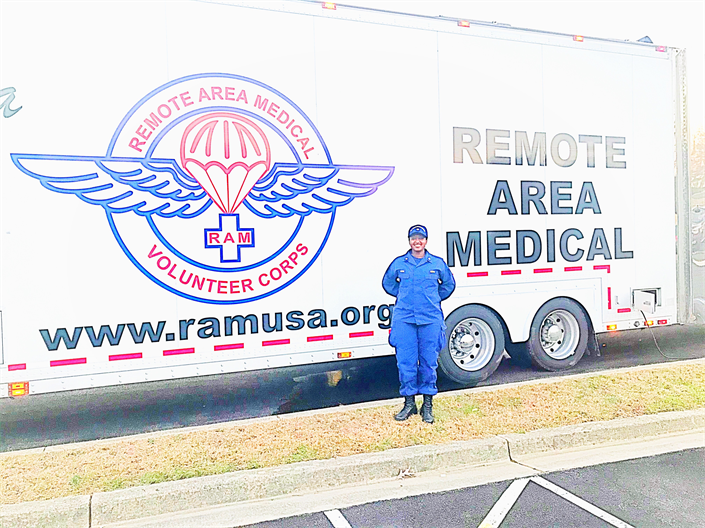Remote Area Medical (RAM) Mission 2019
By LCDR Alesha Harris, PhD
Separations Team Lead
OPDIV: OS/OASH/OSG/CCHQ
Email Address: Alesha.Harris@hhs.gov
What was the mission of this deployment?
Remote Area Medical (RAM) Missions are designed to bring free dental, vision, and medical to under-served communities.
What was your role during this deployment? What skills (scientific, personal, etc.) did you use?
I was serving in the Optician section (Dispensing of Glasses). I occasionally helped patients choose glasses to fit their style & vision needs. I mostly spent time entering health data. That's where I was really needed. Because of my background in complex subjects and my current skill set of processing orders for officers, I was able to quickly learn the RAM data entering system and accurately enter data for each patient. I was glad to make an impact with that task.
Was this your first deployment? Either way, how did you prepare for the deployment, personally or work-wise?
4th deployment. To prepare: I wait to hear/read all of the information given, & then ask any remaining questions. As a junior officer, I feel silly asking whether I need to bring civilian clothes or my own food, but I ask anyway. Also, I get my "day job" to a good stopping place & update my boss on the status of remaining concerns & upcoming work. Lastly, I manage the expectations of my loved ones. I dodge added stress by doing these three things.
Do you have any advice or “pearls of wisdom” for fellow officers who are being deployed or are interested in deploying?
My "pearls of wisdom" for fellow scientist officers is to remember that you're not just gifted at science, you're also gifted at identifying solutions, initiating change when you see the need for it, learning new things in a short amount of time, working with others, communicating important details, doing repetitive but necessary work, providing excellent customer service, etc. You're a scientist, you can do almost anything! Remain confident and speak up.
What was the most important thing you learned during this deployment?
During this deployment I learned that I really did bring a valuable set of skills to the table. A couple of my recommendations were brushed off at first, but eventually came into play once the amount of patients started to increase. I was reminded that as a scientists, I may not have the same role in every deployment, but I can definitely make an impact on the deployment.
What were some of the key challenges that you experienced?
The challenge that I faced this RAM was the balance of teaching someone else a skill & getting the job done in a timely manner. One of the civilian volunteers really enjoyed my task once I taught it to him, but he was not as quick as me. Eventually, I had to take over the task because we were falling behind. Ultimately, I was glad that I gave him so much learning time, because the RAM staff provided a 2nd work station & we both worked to finish the task.
What did you enjoy the most (e.g., favorite memory) about this deployment?
One of my favorite moments from the RAM was seeing my new "day job" teammate and fellow scientist officer, be the talk of the RAM because they found out she was bilingual. She was only supposed to work the set-up on that Thursday, but we needed more translators and she stepped up to the plate, cleared her schedule on Friday, and provided an opportunity for patients to communicate with providers so that they could take advantage of the free care.
What would you consider to be your major accomplishment stemming from this deployment?
Proving that I could learn yet another task at a RAM mission! I'm thinking that I should learn how to make the glasses next!
What were some of the challenges that you experienced during this deployment?
Most of the challenges stemmed from the turnover in officers in their respective roles. Given the varied deployment schedules, you were fortunate to have one day or two of overlap with the persons whose roles you were filling. This made it challenging to preserve institutional knowledge and establish best practices. When given the opportunity, I made an effort to absorb as much information as possible and ask plenty of questions.
Were there any classes or trainings that helped you in your deployment?
The courses about deployment command structure are always good. I at least know where to go to ask certain questions.
How was your post deployment/reintegration experience? Was it a smooth transition back to your daily activities?
This RAM was Friday and Saturday instead of the typical Saturday and Sunday, so I definitely made time for relaxation and sleep on that Sunday before returning to work.
How was your post deployment/reintegration experience? Was it smooth to transition back to your daily life as experienced prior to deployment?
This went quite smoothly for me.
Please feel free to share anything else regarding your deployment to highlight your experiences or to increase the readiness of fellow officers.
Print your orders if you get a copy. Print your car insurance if you're traveling without your own vehicle. Make friends with your fellow deployed officers. PHS is a lot smaller than it seems. You'll see those same officers before you know it.

LCDR Harris standing in front of a truck with the Remote Access Medical logo
Next Deployment Narrative Back to Deployment Narrative homepage